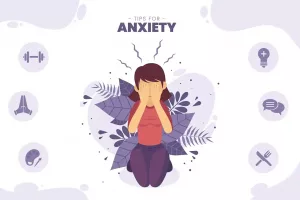Are your thoughts constantly circling around work? Especially now in the crisis it is particularly important to learn to switch off. Experts give 10 tips on how stressed people can find peace.
Let the company be the company and devote yourself to something completely different at the end of the day – many entrepreneurs find this difficult even in normal times. Anyone who now has to fight for their company in the Corona crisis will probably find it even harder to switch off.
What’s more: In our digitalized world, where it is possible to work at any time thanks to smartphones, notebooks and fast Internet, everything else seems more important than relaxing. A mistake. Entrepreneurs should realize that they need to relax at the end of the working day in order to be able to perform again the next day, says Tim Hagemann, Professor of Work Psychology at the Diakonie University of Applied Sciences in Bielefeld. That’s easier said than done. Let’s learn to switch off with these tips.
1. Move The Office Chair To The Desk
Even small things help to leave work behind. For example: push the office chair to the desk. “This is a conscious sign that work is now over and other things are coming up, a ritual that marks the transition,” explains work psychologist Juliane Dreisbach.
2. Create Rituals To Switch Off
At the beginning of the evening, many people are still at work in their heads, says Tim Hagemann. To let go of thoughts of the job, rituals help. It’s best to take half an hour to wind down. During this time, you can go jogging or read the newspaper. The main thing, he says, is for working people to do something that distracts them and is good for them.
3. Say “Stop”
To a certain extent, relaxation is also a question of attitude, says Hagemann. If thoughts of the job arise, you should therefore make an effort to say stop inwardly and push the thoughts aside. Industrial psychologist Juliane Dreisbach recommends doing this quietly out loud and then giving your brain a new task to think about. A simple solution, she says, is to refocus on what you’re doing. That could be reading a book, or it could be the dish you’re preparing for dinner. “It’s about consciously focusing on the now.”
4. Write Down Your Thoughts
Sometimes why you think about work after hours is because your mind is already busy planning for the next day. In that case, it helps to take quick notes and write down what you want to do, says Hagemann. Then you have the thoughts out of your head, but you can be sure that you haven’t forgotten any of it the next day.
5. Make Appointments With Yourself
“You should make appointments with yourself and not always with others,” advises time management expert Lothar Seiwert. Firmly in the calendar – like a work appointment – you can enter walks, sports, gardening or a meditation, he says. “Creating islands of time-out is only possible through proactive planning, otherwise the hectic pace of everyday life will overtake me,” says Seiwert.
6. Throw On The Mental Cinema
If you can’t motivate yourself to go for a walk, do sports or create other time-out islands, you should turn on the mental cinema, recommends work psychologist Juliane Dreisbach: How good does it feel to really work out physically? How relaxed are you when you go for a walk?
If you have such a goal in mind, you can overcome your listlessness more easily. This kind of mental cinema is also helpful, he says, in finding out how one would like to relax most in everyday life. Some people long for silence and want to sit in the garden in peace, others want action and relax by mountain biking in the forest.
7. Talk To Others
Occupational psychologist Hagemann is certain that it has a particularly stress-reducing effect if employees are socially integrated and can talk about their problems with family or friends. Some people may have the impulse not to want to burden others with their anger. However, many people find it helpful to switch off when they talk about work with their partner, for example, during dinner.
8. Turn Off Your Smartphone
Hardly anything get your mind back on the job as quickly as a quick glance at business emails. “It’s a delusion to always have to be reachable,” says Lothar Seiwert. The time management expert is convinced that this “online addiction and the belief that nothing works without me” can only be solved by the personal attitude of each individual. “In the past, when there was no cell phone, you were just not reachable when you went for a walk and the world didn’t end.”
Tim Hagemann suggests creating smartphone-free times. Another tip: To avoid the temptation to check your business e-mails, Hagemann recommends using two different devices for business and private communication.
But what if it’s something really urgent? This is where software can help. Some smartphones, for example, have a “Do not Disturb” mode. In this mode, incoming calls or notifications are blocked. On some devices, exceptions can be added so that you can only be reached by the specifically specified contacts. Then there is the emergency setting. It only lets a call through if a person calls multiple times within a few minutes.
9. Train Mindfulness
“We’re running at way too high a speed and we need to learn again to do nothing, to put on the brakes, to downshift,” Seiwert says. Short meditations without a spiritual reference are a good help: sit down and calm down, observe your breathing rhythm and pulse. Just 15 minutes of inner concentration a day is enough, whether at your desk or during your lunch break, he says.
“We often lack composure and concentration, we are not in the present, but mentally always already at the next task,” says also the personal trainer and motivational coach Michael Kutzner. The mindfulness training of Jon Kabat-Zinn helps to change this with the body scan method, he says. “Without any religious reference at all, entrepreneurs can learn to pay attention to themselves and feel their bodies,” says Kutzner. “How does my big toe feel right now, how am I breathing right now?” Mindfulness training like this can be done on your own. A session lasts 28 minutes. The instructions are available on CD, so you can do it anywhere. Important: The room should be quiet and warm, the smartphone turned off. A floor mat and a pillow to lie on are suitable.
10. Cultivate A Hobby
A hobby brings a fixed routine to the organization of free time. “Everyone should have a hobby and do it at least once a week,” Kutzner says. He’s met people who didn’t know what they enjoyed or what hobby they could have at all, he says. “That’s why it’s important to ask yourself what you look forward to.”
Sports like mountain biking or rock climbing, which require a high level of concentration, are particularly good for forgetting about work and being active in the here and now, says motivational coach Kutzner. They’re sports, he says, that even bosses have to stop thinking about work.
Looking for a new hobby? Here’s one of the best drones on Amazon.













